AI grading online exams isn’t just a futuristic concept anymore – it’s the game-changer that’s rescuing educators from grading purgatory while delivering more consistent, insightful feedback than ever before.
The educational landscape has shifted dramatically. Online learning isn’t the exception, it’s the new normal. Yet many teachers are still grading the old-fashioned way, burning midnight oil over subjective assessments that could be handled more efficiently and accurately by artificial intelligence.
- The Grading Revolution: How AI is Transforming Online Exams
- The Inner Workings: How AI Grading Actually Functions
- The Game-Changing Benefits of AI Grading
- Advanced Features: The Cutting Edge of AI Assessment
- How to Create an AI Grading Exam in OnlineExamMaker?
- Addressing the Concerns: AI Grading Accuracy and Reliability
The Grading Revolution: How AI is Transforming Online Exams
Remember when calculators were considered “cheating” in math class? Now they’re essential tools. Automated exam grading is following the same trajectory, evolving from skepticism to necessity in record time.
Traditional grading methods weren’t designed for our digital-first world. Teachers spend roughly 5-10 minutes per essay, multiplied by dozens or hundreds of students. The math is brutal: a single assignment can consume entire weekends. Meanwhile, students wait days or weeks for feedback that’s often too late to be truly valuable.
AI changes this equation entirely. What once took hours now takes minutes. What once suffered from human inconsistency now delivers standardized evaluation. AI-powered exam assessment doesn’t replace the teacher – it amplifies their capabilities.

The Inner Workings: How AI Grading Actually Functions
Let’s peek behind the curtain. Online exam scoring AI operates on sophisticated algorithms that would make science fiction writers jealous, yet the process is surprisingly intuitive.
Machine Learning: The Brain Behind the Operation
Think of machine learning as a incredibly fast student who never gets tired. These systems analyze thousands of graded examples, learning patterns in language, structure, and content quality. They develop an understanding of what constitutes excellent, good, fair, or poor responses.
Natural language processing, the technology that helps computers understand human communication – works alongside machine learning to evaluate everything from grammar and syntax to conceptual understanding and critical thinking.

Objective vs. Subjective Assessment: The Great Divide
Multiple choice questions? Child’s play for AI. These automated grading for online assessments systems handle objective questions with 100% accuracy, instantly.
But here’s where it gets interesting: subjective questions. Essays, short answers, creative responses – these require nuanced evaluation that many assumed only humans could provide. Modern AI proves otherwise.
Advanced AI-based essay grading software evaluates:
- Content relevance and accuracy
- Argument structure and logic
- Language proficiency and clarity
- Use of supporting evidence
- Creativity and originality
Customizable Rubrics: Your Standards, AI’s Speed
The real magic happens when you can teach AI your specific grading criteria. Customizable rubrics allow educators to input their exact standards, weighting different aspects of responses according to learning objectives.
Want to emphasize critical thinking over grammar? Adjust the rubric. Teaching a creative writing class where originality trumps structure? The AI adapts. This flexibility makes artificial intelligence exam grading truly personalized to each educator’s needs.
OnlineExamMaker AI Quiz Maker – Make a Free Exam in Minutes
What’s the best way to create an AI grading exam online? OnlineExamMaker is the best AI quiz making software for you. No coding, and no design skills required. If you don’t have the time to create your online quiz from scratch, you are able to use OnlineExamMaker AI Question Generator to create question automatically, then add them into your online assessment. What is more, the platform leverages AI proctoring and AI grading features to streamline the process while ensuring exam integrity.
Key features of OnlineExamMaker:
● Create up to 10 question types, including multiple-choice, true/false, fill-in-the-blank, matching, short answer, and essay questions.
● Build and store questions in a centralized portal, tagged by categories and keywords for easy reuse and organization.
● Automatically scores multiple-choice, true/false, and even open-ended/audio responses using AI, reducing manual work.
● Create certificates with personalized company logo, certificate title, description, date, candidate’s name, marks and signature.
Create Your Next Quiz/Exam with OnlineExamMaker
The Game-Changing Benefits of AI Grading
Speed That Defies Physics
While you’re still reading this sentence, an AI system could have graded an entire essay. We’re talking about assessment speeds that transform educational timelines. Students receive feedback within minutes, not days. This immediacy creates learning opportunities that simply didn’t exist before.

Consistency That Humans Can’t Match
Let’s be honest: human graders have bad days. Monday morning fatigue, Friday afternoon brain fog, the influence of grading the exceptionally brilliant paper right before the average one – these factors create inconsistency.
AI doesn’t have mood swings. The 150th essay receives the same careful evaluation as the first. This consistency isn’t just fair – it’s transformative for educational equity.
Detailed Analytics That Reveal Hidden Patterns
AI assessment feedback systems don’t just assign grades; they provide insights. Which concepts are students struggling with most? What types of questions generate the most confusion? These analytics help educators adjust their teaching strategies in real-time.
Scalability Without Compromise
Whether you’re grading 30 exams or 3,000, AI handles the load without breaking a sweat. This scalability makes quality education accessible to larger groups without sacrificing individual attention.
Advanced Features: The Cutting Edge of AI Assessment
Handwritten Answer Recognition
Not all students type their responses. Advanced AI tools for grading online tests now include optical character recognition that can read and evaluate handwritten responses. Your grandmother’s cursive handwriting might stump it, but most student writing is fair game.
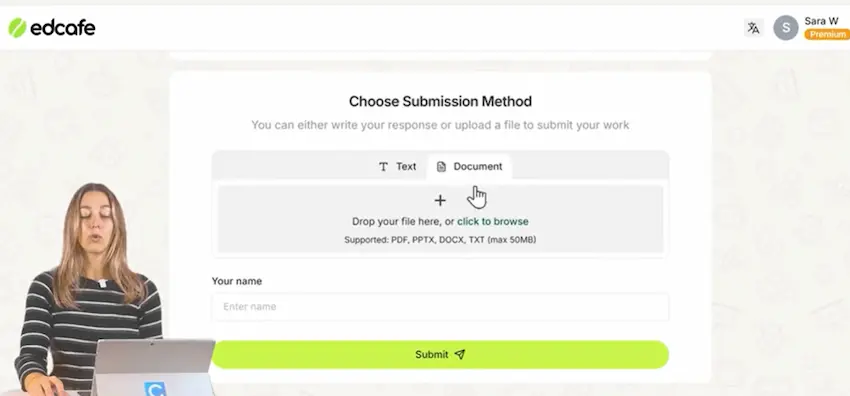
Generative AI for Dynamic Assessment Creation
Why stop at grading when AI can help create assessments too? Modern systems generate personalized questions based on curriculum standards, student performance history, and learning objectives. Each student might receive a unique exam tailored to their learning level.
Real-World Skill Assessment
Traditional exams often test memorization. AI-powered systems can create scenario-based questions that evaluate practical application of knowledge. Students demonstrate understanding through problem-solving rather than regurgitation.
How to Create an AI Grading Exam in OnlineExamMaker?
Create Your Next Quiz/Exam with OnlineExamMaker
Ready to dive in? Here’s your step-by-step roadmap to creating AI-powered student exam analytics with OnlineExamMaker:
Step 1: Account Setup and Navigation
Log into your OnlineExamMaker account and navigate to the exam creation dashboard. Click “Create New Exam” to begin your AI-powered assessment journey.
Step 2: Exam Configuration
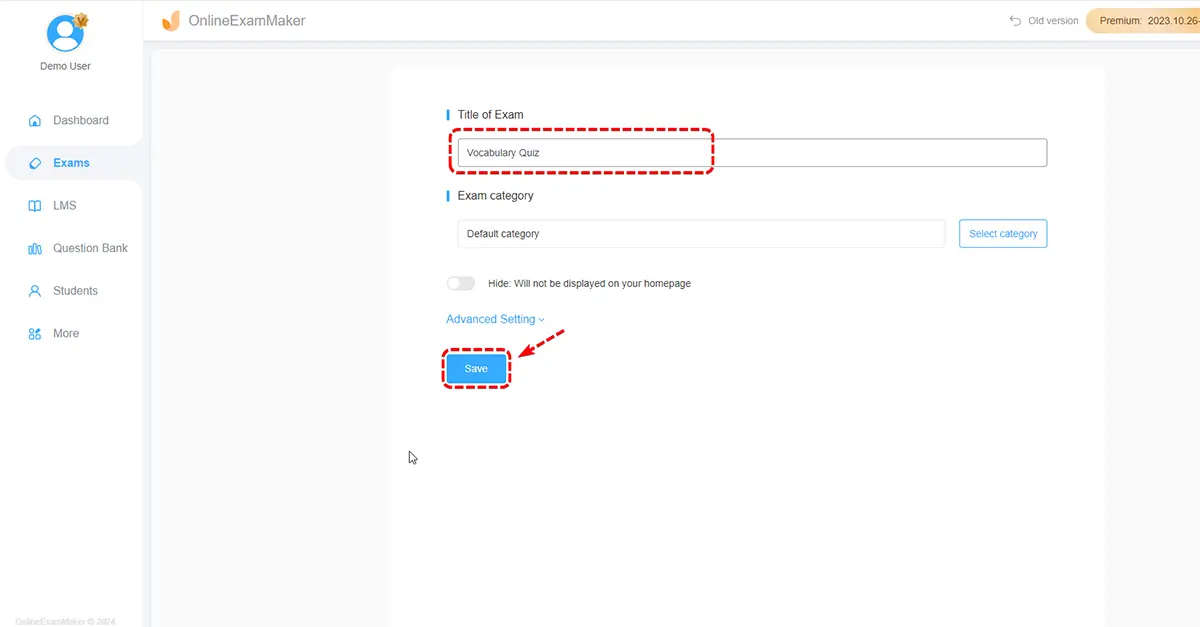
- Enter your exam title and description
- Set duration and attempt limits
- Configure security settings and access permissions
- Enable AI grading features in the assessment settings
Step 3: Question Bank Development
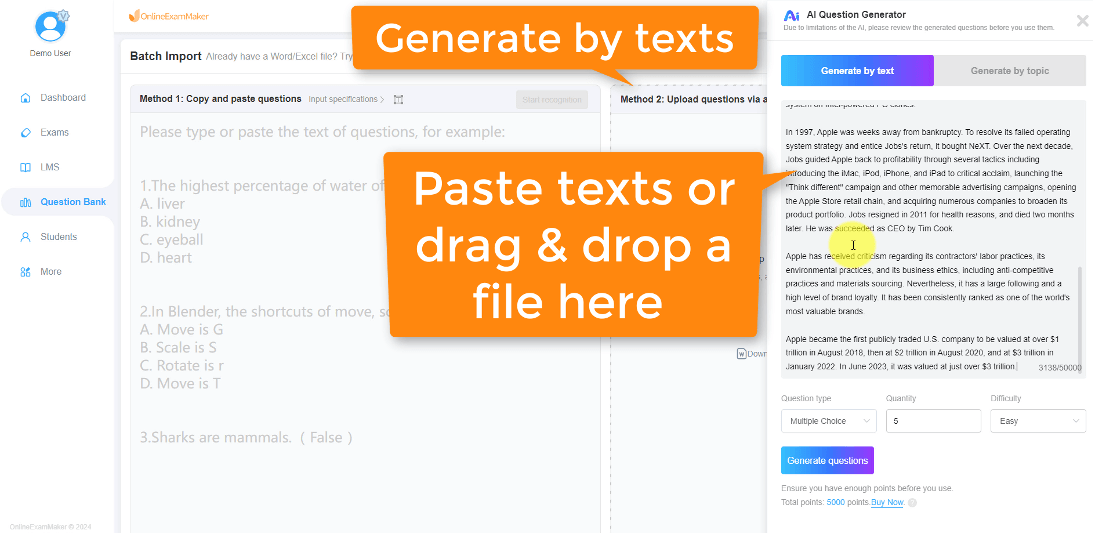
Create your question bank with a mix of objective and subjective questions. For AI grading effectiveness, include clear rubrics for essay questions and open-ended responses.
Step 4: AI Grading Setup
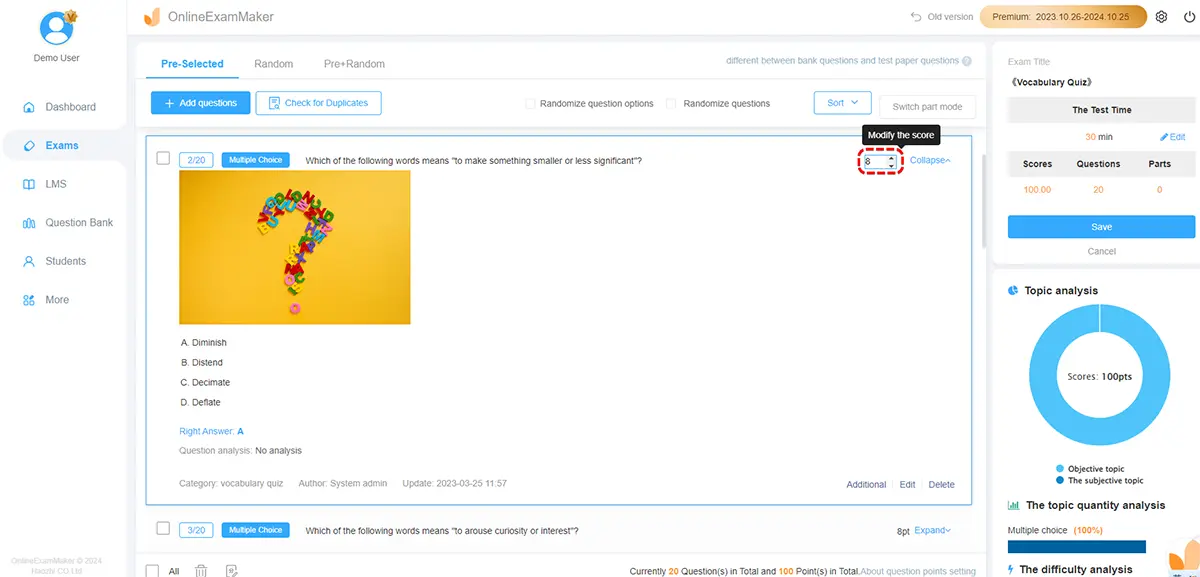
- Upload your custom rubrics for subjective questions
- Set weighting for different assessment criteria
- Configure feedback templates and response parameters
- Test the AI grading with sample responses
Step 5: Review and Deploy
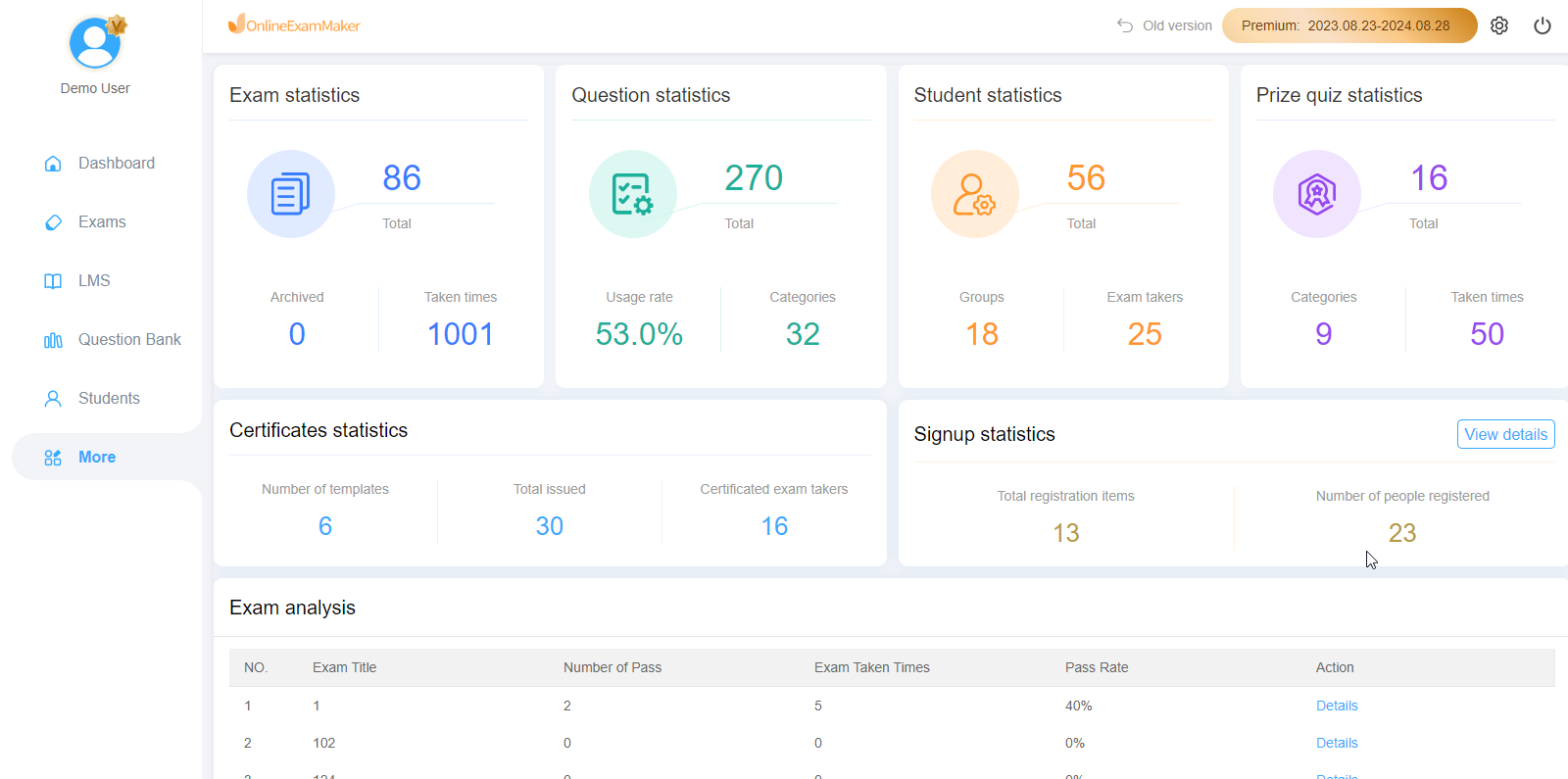
Preview your exam, test all AI grading functions, and deploy to your students. The system will handle the rest automatically.
Addressing the Concerns: AI Grading Accuracy and Reliability
Skepticism is healthy, especially when it comes to educational assessment. Critics raise valid questions about AI grading accuracy and reliability. Let’s address the elephant in the room.
The Accuracy Question
Modern AI grading systems achieve accuracy rates that often exceed human consistency. Studies show that well-trained AI systems can match or surpass human graders in reliability, especially for standardized assessments.
However, accuracy depends on proper setup, adequate training data, and appropriate use cases. AI excels at certain types of assessment but may struggle with highly creative or culturally specific content.
The Human Touch
AI grading isn’t about replacing teachers – it’s about freeing them to focus on what humans do best: creative instruction, emotional support, and complex pedagogical decisions.
The most effective implementations combine AI efficiency with human oversight. Teachers review AI-generated feedback, make adjustments, and add personal touches that technology can’t provide.
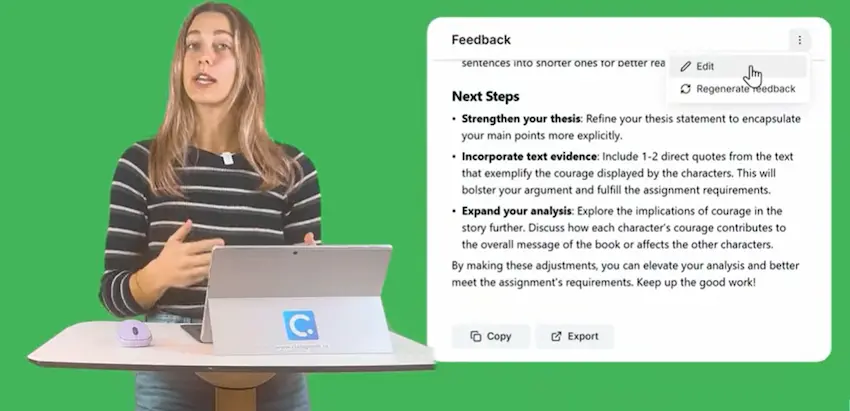
The Bottom Line: Why AI Grading is Worth the Investment
The education world is changing faster than a student’s attention span during a Friday afternoon lecture. Teachers who embrace AI grading online exams aren’t just saving time – they’re improving educational outcomes.
Students receive faster, more consistent feedback. Teachers reclaim hours for instruction and student support. Educational institutions can scale quality assessment without proportional cost increases.
The question isn’t whether AI grading will become standard practice – it’s whether you’ll be an early adopter who shapes the transition or a late adapter playing catch-up.
As one educator put it after switching to AI grading: “I finally have my weekends back, and my students are learning faster than ever. It’s not just a tool change – it’s a teaching philosophy upgrade.”
The future of assessment is here. It’s faster, more accurate, and surprisingly more human than traditional methods. The only question left is: are you ready to grade smarter, not harder?
Frequently Asked Questions
Q: How accurate is AI grading compared to human graders?
A: Modern AI grading systems often achieve accuracy rates of 85-95% compared to expert human graders, with consistency that typically exceeds human reliability over large volumes of assessments.
Q: Can AI grade creative writing and subjective responses?
A: Yes, advanced AI systems can evaluate subjective content using sophisticated natural language processing and customizable rubrics, though human oversight is recommended for highly creative or culturally sensitive content.
Q: What types of questions work best with AI grading?
A: AI excels at objective questions, short answers, essays with clear criteria, and structured responses. It’s most effective when grading criteria are well-defined and consistent.
Q: How long does it take to set up AI grading for exams?
A: Initial setup typically takes 1-2 hours for a comprehensive exam, but once rubrics and criteria are established, creating new exams becomes much faster – often 15-30 minutes.
Q: Is AI grading cost-effective for smaller educational institutions?
A: Yes, many AI grading platforms offer scalable pricing models that make them accessible to institutions of all sizes. But OnlineExamMaker is free to set up, you can easily create an exam with AI grading oline.